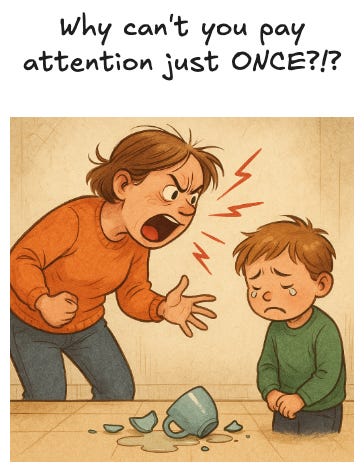You’re Not Clumsy—You’re Just Mismanaging Your Error Budget
From dropped cups to software outages: rethink your margin for mistakes.
When people talk about error culture, there’s a common story that pops up:
You drop a cup in the kitchen as a kid.
Your parent yells: “Why can’t you pay attention just once?”
It’s a familiar moment for many—and also a classic fallacy.
Here’s the problem: the reaction assumes attention is binary. Either you’re paying 100% attention and nothing ever breaks, or you’re somewhere between 0–99%, and eventually something will break.
So if you want to “win,” you have to pay perfect attention all the time. That might sound responsible—but it’s incredibly inefficient.
Let’s talk opportunity cost.
In the example with a child, the cost of constantly paying attention isn’t obvious. Some might argue, “What’s the problem? The kid has plenty of time and energy. But we—the adults—have limited time and budget.”
Fair enough. But let’s take a different example where the cost is more tangible:
I’m self-employed and work full-time. My partner does too. We try to stay healthy by cooking meals from scratch, one or two times a day.
That’s 10 meals a week. At roughly 30 minutes per meal, that’s 5 hours. Based on my hourly rate, those hours have a real monetary cost—well into the three figures.
Meanwhile, our kitchen gear? Mostly Ikea-level basics. For example, the Pokal glass from Ikea costs €0.59.
I break something maybe once every one to two months.
You don’t need a PhD in math to realize: spending extra time and energy being ultra-careful with €0.59 items simply doesn’t make economic sense. The opportunity cost of working slowly far outweighs the occasional broken glass.
So for me, the only logical conclusion: I’m working too slowly in the kitchen.
This realization only clicked for me after reading about the concept of an error budget in the book Site Reliability Engineering: How Google Runs Production Systems.
The idea is simple:
Define an acceptable rate of failure—an error budget.
If you’re within budget: go faster, take reasonable risks.
If you’re over budget: slow down, invest in stability.
An error budget gives your team something critical: a foundation for discussion and a guiding star for the messy reality of day-to-day operations.
It helps avoid the trap of striving for perfection when it’s not economically justified. It replaces shame with pragmatism.
So let me ask you:
What’s your error budget in the kitchen? How many glasses per month is it okay to break?

